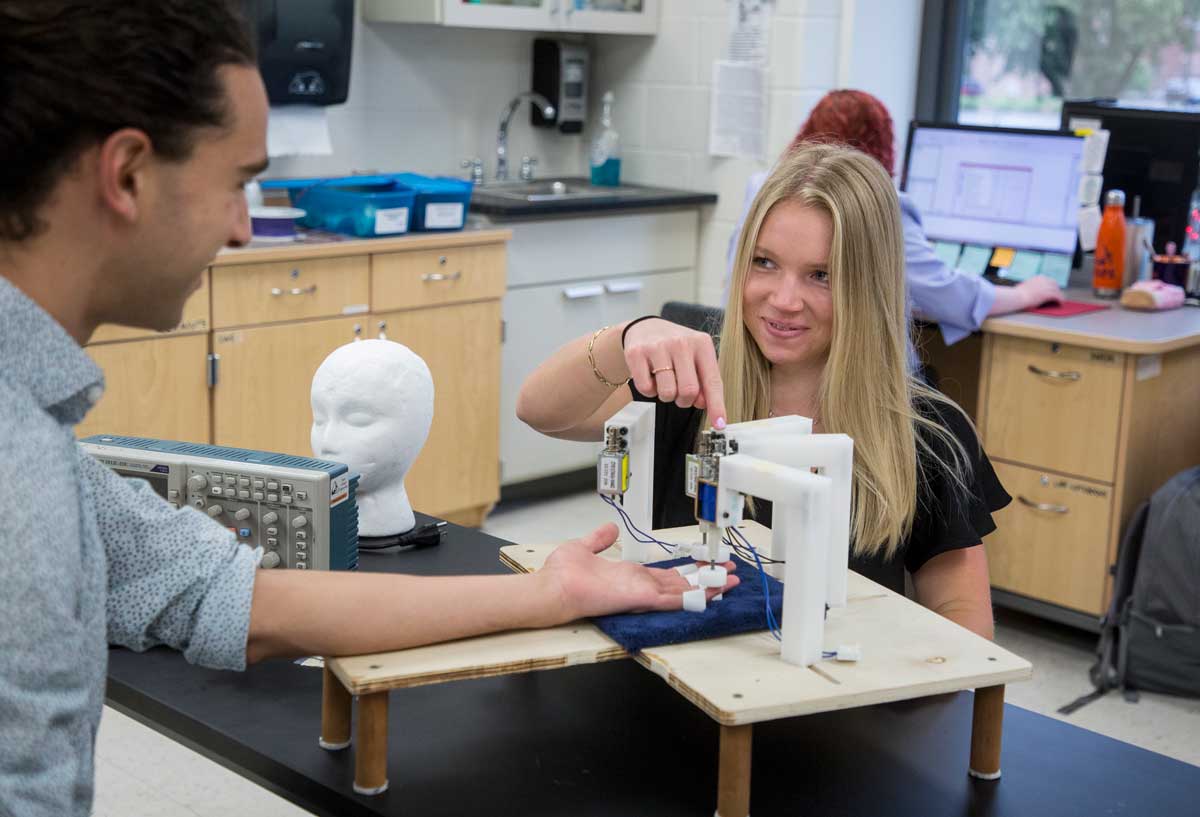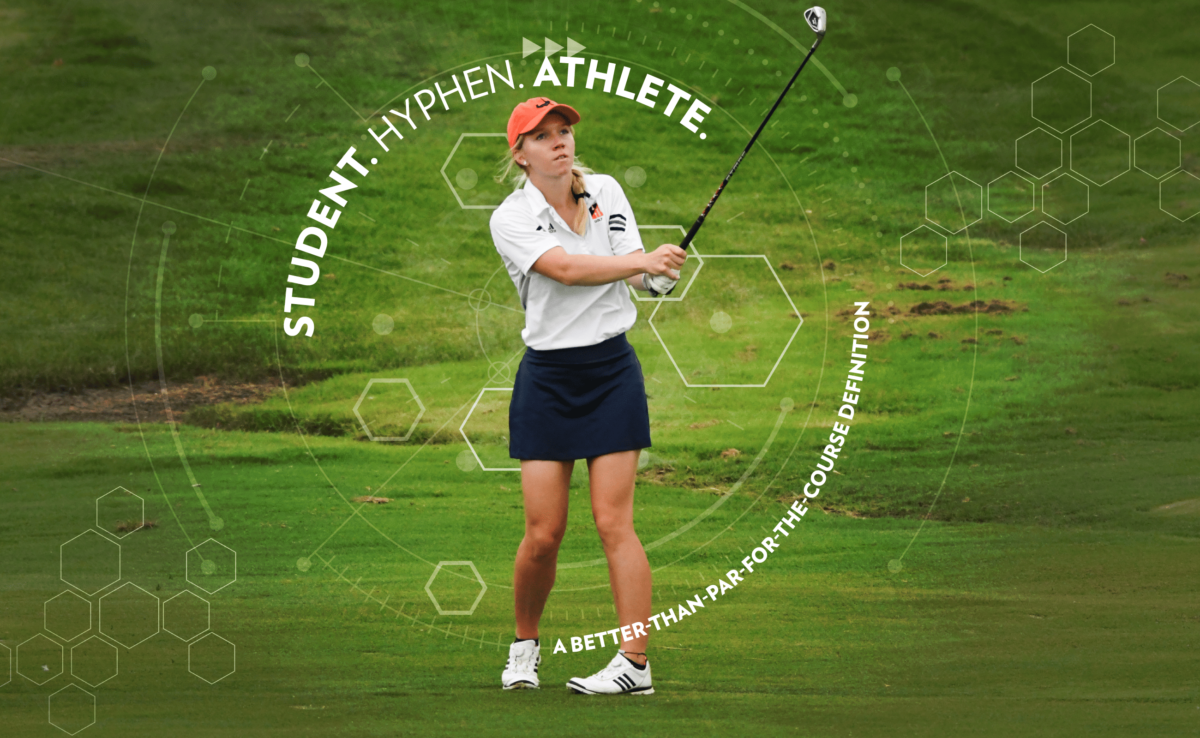Student. Hyphen. Athlete.
A Better-Than-Par-for-the-Course Definition
This is a sports story mainly of the mental kind. It is an exercise in appreciating a small piece of punctuation with a big effect. It is a workout in looking closer at something that seems to separate but actually unites.
Because this is a story of how one young woman with a bright mind and abundant athletic talent takes the noun “student-athlete” and flexes and upholds its definition with brilliance and strength.
Before you go any further, stop for a moment and consider that small but fierce hyphen between student and athlete. Of course, it is there for grammatical necessity. It shows that the two words are joined to each other to indicate that they have a combined meaning.
But that hyphen — it does more than that. That hyphen acts as a steel girder that bridges the two words’ meanings and holds them upright. It is the balance beam that 513 Hope College student-athletes walk on a daily basis, between classrooms and courts, between study groups and team meetings, between exams and competition. Back and forth they go between the two words, between the two worlds, and the hyphen is the path that guides them.
So, how’s that going? How well do Hope student-athletes traverse the hyphen in-between?
In 2020-21, the pandemic year that saw uncertainty, stress, AND achievement in all of Hope academia, 270 Flying Dutch and Flying Dutchmen were named to the Michigan Intercollegiate Athletic Association (MIAA) Honor Roll by having a 3.50 GPA or higher. That total led the league in honorees by school.
“Our student-athletes are amazing and a gift to all of us who interact with them,” says Tim Schoonveld ’96, director of athletics. “Athletics at Hope is about so much more than contests, wins or individual achievements. It is about transforming our student-athletes with a Hope education and their athletic experiences here. Sport is a tool to grow student-athletes into women and men who are strong, confident, love the Lord and are prepared to change the world wherever they go.”
Like Grace VanDellen. The junior mechanical engineering major from Oxford, Michigan, is an award-winning golfer, a biomedical researcher and a 4.0-GPA student who appears to travel the student-athlete hyphenation highway with the ease and calm of a country drive. As with her fellow student-athletes, though, the four-year academic and athletic trip is fueled by hard work and sacrifice. A good deal of joy powers the process, too.
When VanDellen earned the MIAA’s Most Valuable Golfer Award this fall, she did so by lopping five strokes off her average score from the spring before. That kind of improvement in six months in the golf world — from an 83.20 stroke average in spring 2021, to 78.17 in fall 2021 — is like shaving a massive 10 minutes off a marathon time over the same length of training. As she walked up to accept her most-valuable award after the season-ending round played at Bedford Valley Country Club in Battle Creek, Michigan, VanDellen quickly gathered in her trophy and then immediately tried to return to be with her teammates who were applauding with gusto far beyond the polite golfer’s clap. Told she needed to wait a minute for a photo op, VanDellen complied, but looked obviously uncomfortable.
“I mean I was proud of myself, but it felt a little awkward,” VanDellen remembers, a slight smile betraying her continued humility.
“That’s Grace,” says head coach Greg Stafford. “She has no airs about her. She’s just an outstanding person. I can’t say enough about her as a student, as a Christian, as a golfer. She’s right up there at the top of anybody I’ve ever known, and I’ve been coaching for a few years.”
Stafford, who actually has been a high school and college coach across four decades, has had the best view of VanDellen’s blossoming game both physically and mentally. Standing just 5-feet-five-inches tall, she hits drives averaging 220 yards. But it is the six inches between her ears that affects her play most of all. Her cerebral attack of a golf course is one reason Stafford terms her style of play as “very, very calculated.”
“Plus, the thing Grace does very well is she just keeps playing hard even when she may have a reason to be frustrated,” observes Stafford, whose teams have won four MIAA championships during his 13-year tenure, including this fall’s title. “In competitive golf, it’s what you do after you have a bad shot that makes or breaks you. And that’s where she’s brilliant because she never has two in a row.”
“If I hit a bad shot, I just say to myself, ‘Well, let’s go see what you can make out of that,’” VanDellen calmly says, confirming her coach’s observation. “Coach Stafford always says that it’s us against the course, that we are not necessarily playing against another person. That helps. And I’ve worked a lot on my confidence. . . I fight until the very last putt. Every shot is a fresh start.”

There is a connection, of course, between the modes of operation of Grace the Golfer and Grace the Scholar. For the young woman who has loved math, science and golf since she was a an eight-year-old girl, identifying a problem, concocting a theorem and then finding an answer play out on the links as ball trajectory and wind speed and green slope, and in engineering as forces, torques and deflections. When she conducted full-time research for 10 weeks last summer in Dr. Katie Polasek’s biomedical engineering laboratory that investigates ways to engineer therapies for amputees who experience phantom limb pain, VanDellen encountered a whole new course of troubleshooting.
“Grace likes to know exactly what needs to be done, then she does it well and goes forward. But doing research, it doesn’t always line up that way,” says Polasek, associate professor of engineering, of the trial-and-error, error-and-trial nature of research work. “So, when I talked to Grace after several weeks of research, and she admitted that she’d been really nervous about it in the beginning, I didn’t know. I couldn’t tell. She did a good job of asking the questions that needed to be asked and then moving forward and doing the next thing that needed to be done in order to try to solve the problems we were having.”
Sometimes that even required extra trips to the hardware store and late-evening sessions in the lab.
“With research, I view it as more like real-world, problem-solving engineering that can help others,” VanDellen explains. “My classes are preparing me to know how to problem solve, to know how to think critically, and they’re giving me that foundation of the formulas. But this research has shown me the ways to problem solve and use those formulas that can eventually make a difference in someone’s life.”
When asked if she could, would she like to be a professional golfer, VanDellen — practical, unpretentious, with a sports hero (NFL quarterback Trevor Lawrence) who doesn’t even play the game she plays — takes a hard pass. She loves golf, but to make it her livelihood could ruin her joy of the sport that she knows she’ll play the rest of her life. She may be frightened by golf-course geese (and if you’ve ever encountered them, you can’t blame her), but she is not afraid to go after what she wants to accomplish. And what she would like to do post-graduation is work for a golf-club maker like Titleist or Calloway to test and analyze equipment. She doesn’t want to design clubs, mind you. That showy stuff she’ll leave to others. Instead, VanDellen would prefer to engineer the ways that grip, shaft and clubhead come together as a whole to make a player better. Finding combinations for success is her jam.
“When I think of the last two years, I think I’m most proud of how I’ve grown,” the down-to-earth MVP confides. “I have found a balance between maintaining grades, building relationships and playing a sport. I have found the importance of being present in all circumstances.”
That last statement, spoken by someone who lives it every day, is essentially the crux of a student-athlete’s existence. And it is essential to Grace VanDellen’s well-played, well-educated, well-hyphenated, student-athlete story.
Hope’s 2021 MVP Team
An impressive number of Flying Dutch and Flying Dutchmen were named the MIAA’s most valuable athletes in calendar year 2021. Along with Grace VanDellen, eleven others were top performers in the league, the most of any MIAA school in that time period. As a whole, this MVP squad had an average GPA of 3.64.
- Emma Schaefer (Women’s Swimming), exercise science major
- Kamaron Wilcox (Men’s Diving), physics and math double major
- Kenedy Schoonveld (Women’s Basketball), social work major
- Ana Tucker (Women’s Indoor Track), exercise science major
- Nick Hoffman (Men’s Indoor and Outdoor Track), public accounting major
- Sydney Jackson (Women’s Tennis), biomedical/bioelectrical engineering major
- Jacob Burkett (Men’s Tennis), business major
- Jack Radzville (Men’s Lacrosse), electrical engineering major
- Ty Dalton (Men’s Soccer)*, communication major
- Grace Behrens (Women’s Outdoor Track), environmental science major
- Grace VanDellen (Women’s Golf), mechanical engineering major
- Tracy Westra (Volleyball), environmental engineering major
*Spring 2021 season

